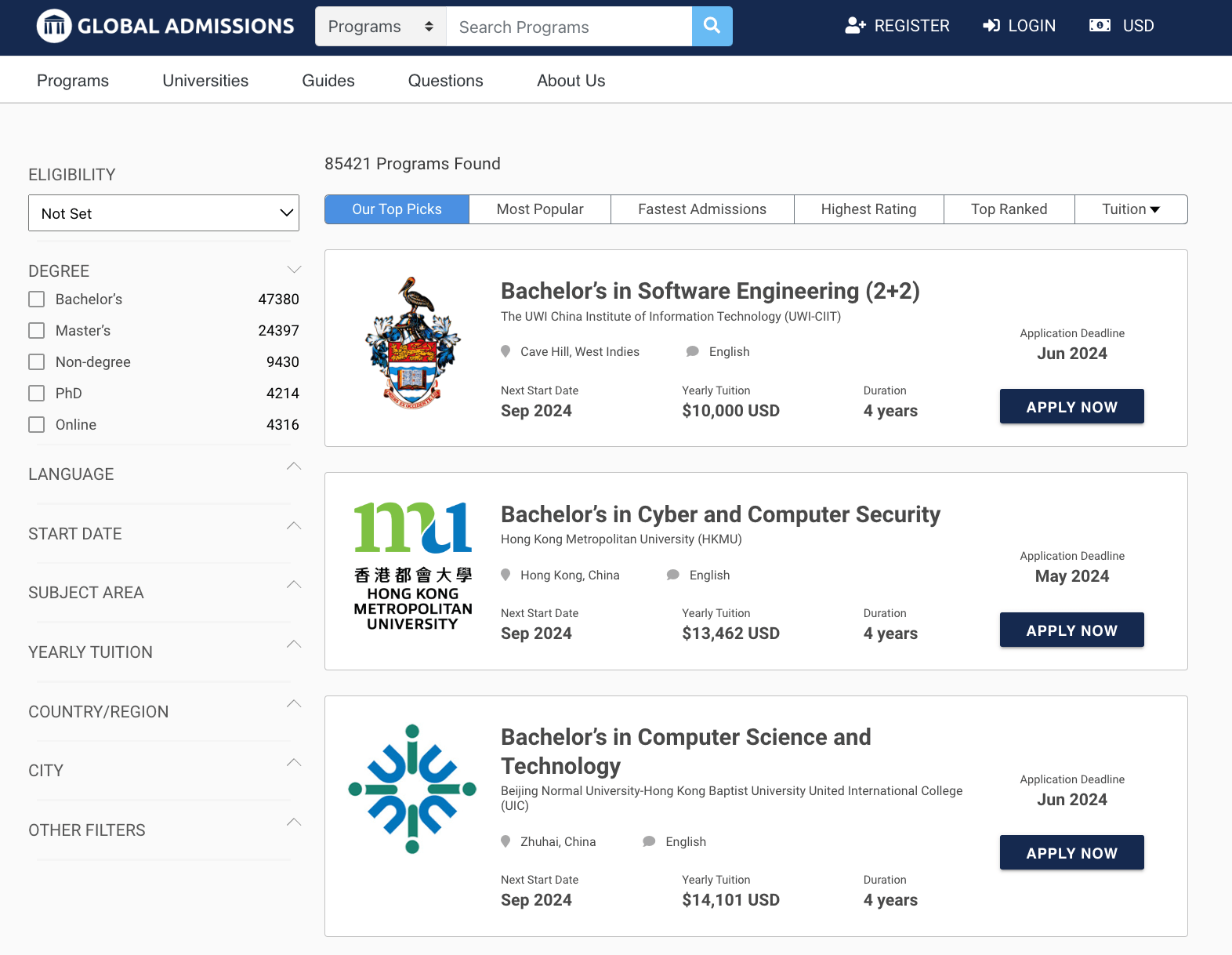Mark Twain: “The secret of getting ahead is getting started.”
Studying in a top world class university can change your life.
I know. I’ve seen it first hand.
A Rwandan refugee who got accepted into one of the world’s top universities, and then started his own company.
That’s just one of many thousands we have helped at Global Admissions.
The connections and people you meet.
It can change your life.
100 tips to get into a top world class university
Gaining admission to a top-ranked university is a challenging but achievable goal.
Here’s a comprehensive guide with 100 tips to help you enhance your application and increase your chances of acceptance at a prestigious institution.
Understanding the Basics
- Start Early: Begin preparing years in advance to build a strong profile.
- Research Thoroughly: Understand the strengths of different universities and choose ones that align with your goals.
- Know the Requirements: Each university has specific admission criteria; know them well.
- Meet the Academic Standards: Maintain a high GPA.
- Standardized Tests: Prepare extensively for tests like the SAT, ACT, GRE, GMAT, depending on your level of study.
- Take Rigorous Courses: Enroll in AP, IB, or A-level courses if available.
- Understand the Application Process: Know each element of the application process.
- Follow Deadlines: Missing a deadline can be disqualifying.
- Ask Questions: Contact admissions officers if anything is unclear.
- Plan Visits: If possible, visit the campus to gain insights and demonstrate interest.
Building a Strong Application
- Craft a Compelling Personal Statement: Tailor it to each university.
- Curate Strong Letters of Recommendation: Choose recommenders who know you well.
- Showcase Leadership: Engage in activities where you can take on leadership roles.
- Demonstrate Commitment: Long-term commitment to activities is more valuable than short stints.
- Diversify Your Interests: Engage in a variety of extracurricular activities.
- Excel in Standardized Tests: High scores can significantly boost your application.
- Apply for Early Decision/Early Action: If you’re sure of your first choice, this can demonstrate commitment.
- Highlight Unique Experiences: Distinct experiences can set you apart from other applicants.
- Be Authentic: Authenticity resonates more than trying to fit a mold.
- Seek Feedback on Essays: Have mentors or advisors review your applications and essays.
Enhancing Your Profile
- Engage in Community Service: Show you’re involved in making a difference.
- Pursue Internships: Related internships can bolster your application.
- Join Academic Competitions: Competitions like math or science olympiads can showcase your expertise.
- Publish Research: If possible, get involved in research and aim to publish.
- Attend Workshops and Camps: These can enhance skills and show dedication.
- Develop a Specialized Skill: Unique skills can make your application stand out.
- Network: Engage with alumni and faculty of the university.
- Learn Languages: Multilingual abilities are attractive, especially for international programs.
- Stay Informed: Keep up with current events and trends related to your field.
- Manage Your Online Presence: Maintain a professional persona online.
Preparing Financially
- Understand the Costs: Be aware of tuition and living expenses.
- Apply for Scholarships: Look for scholarships and grants.
- Consider Financial Aid: Apply for need-based financial aid if available.
- Plan for Loans: Understand the implications of educational loans.
- Seek Sponsorships: Some organizations offer sponsorships for talented students.
- Work Part-Time: If regulations allow, part-time work can help support your studies.
- Save Early: Start saving for college well in advance.
- Budget Wisely: Manage your finances prudently.
- Explore Student Discounts: Take advantage of any student discounts.
- Fundraise: Crowdfunding platforms can help raise funds for education.
Application Techniques
- Be Organized: Keep track of documents, deadlines, and requirements.
- Double-Check Applications: Errors can make a bad impression.
- Prepare for Interviews: Some top universities require interviews.
- Use Action Words in Applications: Words like ‘achieved’, ‘developed’, ‘led’.
- Answer Honestly: Always provide truthful information.
- Customize Applications: Tailor each application to reflect the university’s values.
- Practice English Proficiency: For non-native speakers, proficiency in English is crucial.
- Include Supplementary Materials: If allowed, these can enhance your application.
- Stay Motivated: The application process can be long and demanding.
- Rest Before Tests: Ensure you are well-rested before any exams.
Developing Soft Skills
- Cultivate Communication Skills: Effective communication is key in interviews and essays.
- Enhance Your Public Speaking: Useful for interviews and presentations.
- Build Confidence: Confidence can improve your performance in interviews and interactions.
- Develop Critical Thinking: Important for tackling essay questions and interviews.
- Practice Time Management: Essential for balancing application preparation with studies.
- Learn Stress Management Techniques: Helps in maintaining your performance under pressure.
- Work on Team Skills: Demonstrates your ability to work effectively in group settings.
- Cultivate Empathy and Global Awareness: Shows your readiness to join a diverse student body.
- Negotiation Skills: Useful in group projects and discussions.
- Adaptability: Shows that you can handle the challenges of a rigorous academic environment.
Staying Informed
- Subscribe to Relevant Journals: Stay updated on the latest research in your field.
- Follow News Related to Potential Majors: Shows genuine interest during interviews.
- Watch TED Talks: Learn from global thought leaders.
- Read Books by University Professors: Familiarize yourself with the academic work of potential instructors.
- Engage with Academic Forums: Participate in discussions and networks.
- Attend University Webinars: Many top universities offer free webinars.
- Visit Educational Fairs: Meet representatives from different universities.
- Utilize Library Resources: Access papers and books relevant to your intended field of study.
- Listen to Podcasts: Educational podcasts can provide insights and learning opportunities.
- Engage on Social Media: Follow universities and academic leaders.
Leveraging Technology
- Use Educational Apps: Enhance learning through apps like Khan Academy, Coursera.
- Familiarize Yourself with Software Relevant to Your Field: Such as statistical software for social sciences.
- Online Courses: Complete courses relevant to your intended major.
- Maintain a Professional LinkedIn Profile: Network with alumni and professionals.
- Create a Digital Portfolio: Especially for fields like art, design, or architecture.
- Use Project Management Tools: Organize your application tasks effectively.
- Utilize Video Conferencing Tools: Prepare for potential virtual interviews.
- Engage in Virtual Campus Tours: If you can’t visit in person.
- Prepare Digital Presentations: Useful for interviews where you need to showcase past work.
- Utilize Online Research Databases: For deeper understanding of academic topics.
After Submission
- Follow Up: Send thank you notes to interviewers and references.
- Check Application Status: Some universities allow you to track your application online.
- Prepare for Possible Rejection: Be ready to consider alternatives.
- Stay Engaged with the University: Continue showing interest.
- Review and Reflect: Learn from the application process for future applications.
- Wait Patiently: This period can be long, but stay focused on your goals.
- Plan for Visa Applications: If studying internationally.
- Prepare for Transition: Plan your accommodation, finances, and travel.
- Connect with Future Classmates: Join forums or social media groups.
- Celebrate Your Acceptance: Recognize your hard work and achievements.
Long-term Considerations
- Set Long-term Academic Goals: Plan your university path ahead.
- Consider Career Options: Think about how your chosen field of study aligns with your career aspirations.
- Plan for Internships: Look ahead to potential internships during your university years.
- Consider Graduate Studies: If your field of study typically requires advanced degrees.
- Develop a Professional Network: Start building connections that can aid in your future career.
- Stay Curious and Committed: The learning journey continues beyond getting accepted.
- Evaluate Your Progress: Regularly assess your academic and personal growth.
- Seek Mentorship: Finding a mentor can provide guidance through your university years.
- Prepare for the Job Market: Enhance skills that will be valuable in your future career.
- Keep Learning: Stay open to new opportunities for learning and growth.
This comprehensive guide offers a roadmap for preparing a strong application to top-ranked universities worldwide. Each step requires dedication and effort, but with persistence, the payoff can be your acceptance into a world-class institution, paving the way for future success.
Getting into a top university worldwide can be life changing.
Having said all this.
It’s not everything
But there are many other ways to get advantages in life.
And you don’t even need to go to university to be successful!
The important thing is to keep learning and discover yourself.
Be the best that you can be.
Take education into your own hands.
You have the power to shape your future.
Related Quotes
- Nelson Mandela: “Education is the most powerful weapon which you can use to change the world.”
- Malala Yousafzai: “One child, one teacher, one book, and one pen can change the world.”
- Michelle Obama: “Don’t be afraid. Be focused. Be determined. Be hopeful. Be empowered.”
- Albert Einstein: “Intellectual growth should commence at birth and cease only at death.”
- Desmond Tutu: “Do your little bit of good where you are; it’s those little bits of good put together that overwhelm the world.”
- Ralph Waldo Emerson: “Do not follow where the path may lead. Go instead where there is no path and leave a trail.”
- Robert Frost: “Education is the ability to listen to almost anything without losing your temper or your self-confidence.”
- Aristotle: “The roots of education are bitter, but the fruit is sweet.”
- Mark Twain: “The secret of getting ahead is getting started.”
- Steve Jobs: “The only way to do great work is to love what you do.”
Helpful Links for Applying to Top Universities
For students looking to explore more about applying to top universities worldwide, here are some useful resources, including the option to book a consultation call:
- Global Admissions: This platform provides comprehensive information on universities worldwide and supports students through the application process, including booking calls for personalized advice.
- Visit Global Admissions (Where you can book a call for consultation)
- QS Top Universities: Offers detailed information on university rankings, courses, and scholarship opportunities.
- The Princeton Review: Known for its test prep services, The Princeton Review also provides university admission consulting.
- Fulbright Scholar Program: Provides comprehensive info on one of the most prestigious scholarship programs for studying abroad.
- College Board: Offers resources for SAT preparation and college planning, crucial for admission to many top universities.
- EducationUSA: A U.S. Department of State network that promotes U.S. higher education to students around the world by offering accurate, comprehensive, and current information about opportunities to study at accredited postsecondary institutions in the United States.
These resources can help guide you through the process of selecting and applying to top-ranked universities globally, providing essential tools from test preparation to personal guidance on application strategies.

